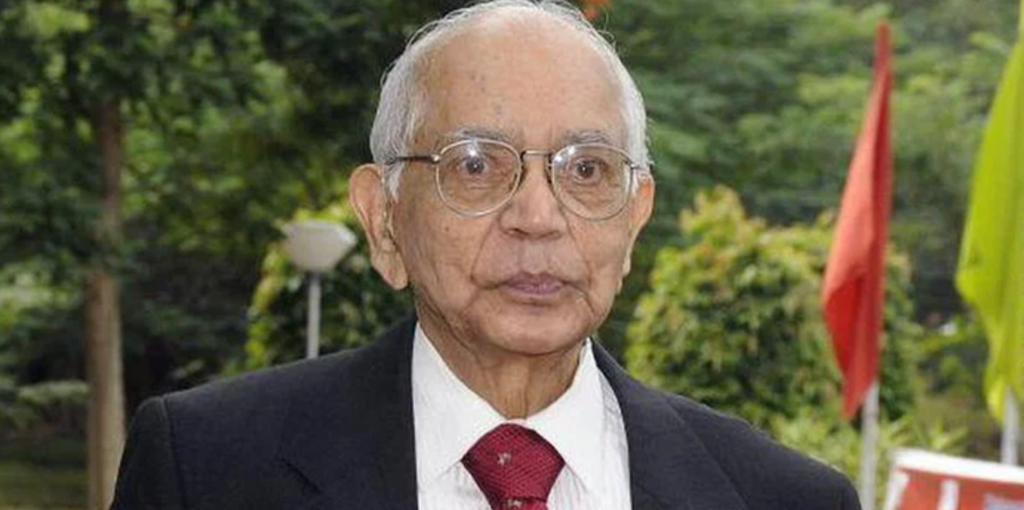Calyampudi Radhakrishna Rao is a renowned Indian-American mathematician and statistician. He was born on September 10, 1920, in India. He is 102 years and still making Indian Prods with his marvellous achievements in the field of Mathematician and statisticians. He will receive 2023 International Prize in Statistics, which is equivalent to the Nobel Prize in the field of Mathematician and Statistician this July. Along the Prize he will also get USD 80,000 award, at the biennial International Statistical Institute World Statistics Congress in Ottawa, Ontario, Canada.
Who is Calyampudi Radhakrishna Rao?
C.R. Rao is known for his pioneering work in multivariate statistical analysis, experimental design, and the theory of estimation. He has made numerous contributions to the field of statistics and has received many awards and honours throughout his career, including the US National Medal of Science in 2002, which is the highest scientific honour in the United States.
Rao has also authored many books and research papers, and has held various academic positions throughout his career, including professorships at universities in India, the United Kingdom, and the United States. He is widely regarded as one of the most influential statisticians of the 20th century and has made significant contributions to the development of modern statistics and its applications in various fields.
Background of C.R. Rao
Calyampudi Radhakrishna Rao was born on September 10, 1920, in Hadagali, a small town in present-day Karnataka, India. His father, C. Gopala Rao, was a mathematics teacher, and his mother, Lakshmamma, was a homemaker.
Rao showed an early aptitude for mathematics, and his father recognized his talent and encouraged him to pursue it. He attended Andhra University in Visakhapatnam, India, where he earned a bachelor’s degree in mathematics in 1940 and a master’s degree in statistics in 1943.
In 1948, Rao was awarded a scholarship to study at the University of Cambridge in the United Kingdom, where he earned a Ph.D. in statistics in 1948. After completing his Ph.D., he returned to India and worked as a lecturer and professor at several universities, including the Indian Statistical Institute in Calcutta.
In 1964, Rao moved to the United States and joined the faculty of the University of Pittsburgh as a professor of statistics. He later held faculty positions at several other universities, including the University of Wisconsin-Madison, and the Pennsylvania State University.
Throughout his career, Rao has made numerous contributions to the field of statistics, including the development of various statistical methods and techniques that have become widely used in many fields, including the social sciences, engineering, and medicine. He has also mentored many students and researchers, and has received numerous awards and honours for his contributions to the field of statistics.
Career
C.R. Rao’s career in statistics began when he was a student at Andhra University in Visakhapatnam, India. He studied mathematics and statistics, earning a bachelor’s degree in mathematics in 1940 and a master’s degree in statistics in 1943.
After completing his master’s degree, Rao worked as a lecturer at the Indian Statistical Institute (ISI) in Calcutta, India. During this time, he began to work on his Ph.D. in statistics at the University of Cambridge in the United Kingdom, where he was awarded a scholarship in 1947.
Rao completed his Ph.D. in 1948, and his thesis on “Statistical Problems of Biological Classification” was a pioneering work in the area of multivariate statistical analysis. After completing his Ph.D., he returned to India and continued to work at the ISI, where he established a research program in statistics.
In 1964, Rao moved to the United States to take a position at the University of Pittsburgh, where he became a professor of statistics. He remained at the University of Pittsburgh until 1979, when he moved to the University of Wisconsin-Madison, where he became a professor of statistics and mathematics.
Throughout his career, Rao made significant contributions to the field of statistics, including the development of many statistical methods and techniques that are widely used in various fields. He also authored or co-authored over 500 research papers and several books, and mentored many students and researchers.
Achievements by C.R. Rao
Calyampudi Radhakrishna Rao, also known as C. R. Rao, is a highly respected and influential statistician who has made significant contributions to the field of statistics. Here are some of his notable achievements:
- Multivariate statistical analysis: Rao is known for his pioneering work in multivariate statistical analysis, which involves analysing data with multiple variables. He has developed many statistical techniques and methods for multivariate analysis, which are widely used in various fields.
- Experimental design: Rao has also made significant contributions to the theory and practice of experimental design, which involves planning experiments to obtain the most informative data possible. He has developed many statistical techniques and methods for optimal experimental design, which are widely used in various fields.
- The theory of estimation: Rao has also made significant contributions to the theory of estimation, which involves estimating unknown parameters from data. He has developed many statistical techniques and methods for estimation, which are widely used in various fields.
- Awards and honours: Rao have received numerous awards and honours throughout his career, including the US National Medal of Science in 2002, which is the highest scientific honour in the United States. He has also been elected to several prestigious academies, including the National Academy of Sciences in the United States, the Royal Society in the United Kingdom, and the Indian National Science Academy.
- Publications: Rao has authored or co-authored over 500 research papers and several books, including “Linear Statistical Inference and Its Applications,” which is widely regarded as a classic in the field of statistics.
- Mentoring: Rao has mentored numerous students and researchers throughout his career, many of whom have gone on to become successful statisticians in their own right.
Overall, Rao’s contributions to the field of statistics have been wide-ranging and highly influential, and he is widely regarded as one of the most important statisticians of the 20th century.

